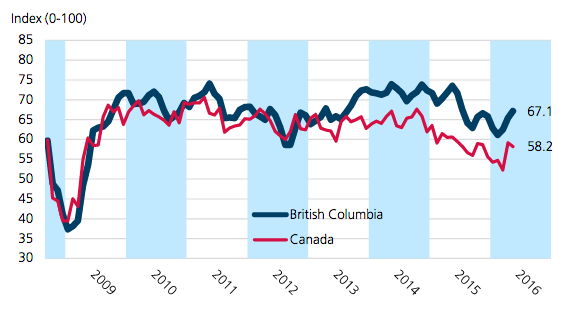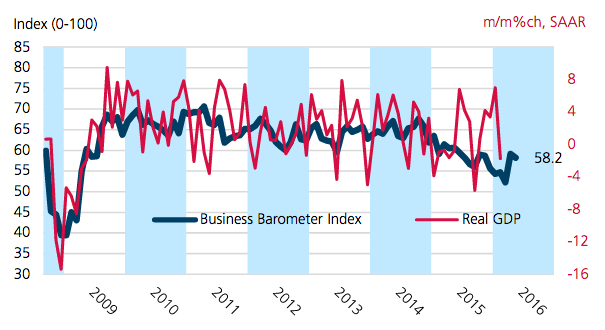Small businesses across British Columbia reported feeling a bit more optimistic in May than they have in the past year, according to the Canadian Federation of Independent Business (CFIB).
The CFIB Business Barometer index for B.C. gained almost two points in May, reaching 67.1—almost nine percentage points above the national average of 58.2—making it the second most optimistic province in Canada after Prince Edward Island (75.0).
Twenty five per cent of B.C. small business owners say they plan to hire more staff in the next three months, while 9% say they plan to cut back. Overall, 48% say their businesses are in good shape and 12% say they are in poor shape.
A shortage of skilled labour remains the biggest challenge to sales and production growth, with 35% saying this is their top concern. This is followed by insufficient domestic demand (32%) and management skills and time constraints (30%).
Cost-wise, the biggest constraints are tax and regulatory costs, 56% of respondents report. This is followed by insurance costs (48%) and wage costs (42%).
Business Barometer Index in B.C., presented as 3-month moving average, based on 252 responses

Source: CFIB
Across Canada, business optimism dipped in May, from 59.2 in April to 58.2. Despite this drop, optimism remains higher than in the first quarter of 2016.
“This was overall a good report,” said Admir Kolaj, economic analyst at TD Economics. “While the headline metric of small business confidence nudged lower, this came atop of a sharp spike in sentiment in the prior month.
“The positive take is further corroborated by the fact that the downtick was not broad-based with most of last month’s gains sustained into May.”
The highest levels of optimism were found in hospitality (65.8), health and education services (61.8) and manufacturing (60.5). The lowest levels were seen in natural resources (32.7), transportation (48.5) and construction (51.1).
Business Barometer Index across Canada, presented as 3-month moving average, based on 252 responses

Source: CFIB
Across Canada, 21% of firms say they plan to hire within the next three months, while 12% say they plan to cut their staff. Thirty nine per cent of those surveyed said they felt good about the general state of their businesses, compared with 14%.
Kolaj pointed out that an encouraging sign for the Canadian economy is the fact that confidence in Alberta increased a full six percentage points in the month, reaching 34.6, although this remains well below the national average in the month.
“While this appears to correspond to an increase in the price of crude oil, it nonetheless may mark a turning point for confidence,” Kolaj said.
“While the recent wildfire-related devastation and production shut-downs have undoubtedly affected provincial economic growth and will likely register as an economic contraction in the second quarter nationally, we expect that both the provincial and national economy will rebound later this year as reconstruction efforts ramp up and oil production resumes.”
The Business Barometer index measures small business owners’ sentiments about how their companies are likely to perform in the next year. An index over 50 means the owners expect conditions to improve. Nationally, the index is normally between 65 and 70, a number that indicates the economy is growing at its optimum level.
@EmmaHampelBIV
Check out BIV’s podcast for the week of May 17, 2016:




